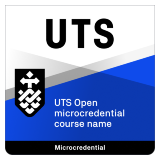Discounts are available for this course as follows:
- Early bird price of $1,454 (GST free)*. Use discount code CRUNCHEBMAY26 during checkout - available until 11.59pm Monday 6 April 2026 (AEST)
- 10% discount for UTS staff, alumni and students
- 10% discount for group enrolments of 4 to 9 from the same organisation booked same day
- 15% discount for group enrolments of 10 or more from the same organisation booked same day.
See below for how to obtain your discount code.
Discounts cannot be combined and only one discount can be applied per person per course session. Discounts can only be applied to the full price. Discounts cannot be applied to any offered special price.
How to obtain your discount code (group enrolments)
Please contact the team at support@open.uts.edu.au with details of group enrolments, to obtain your discount code. Note that group enrolments will not be validated until the minimum number of criteria enrolments have been received.
How to enrol and obtain your UTS staff discount (UTS staff)
Please contact the team at support@open.uts.edu.au in order to secure your enrolment and 10% staff discount.
How to apply your discount code
If you are eligible for a UTS alumni or student discount, please ensure you have provided your UTS student number during checkout. If you are an alumni and have forgotten your UTS student number, email support@open.uts.edu.au with your full name, UTS degree and year of commencement.
- Add this course to your cart
- Click on "View Cart" (blue shopping trolley at top right of screen). You will need to sign in or sign up to UTS Open
- Enter your eligible code beneath the "Have a discount code?" prompt and click on the blue "Apply" button
- Verify your discount code has been successfully applied before clicking on the blue "Checkout" button.


















